Israel Says Hezbollah Drones Launched At Gas Rig Were Iranian
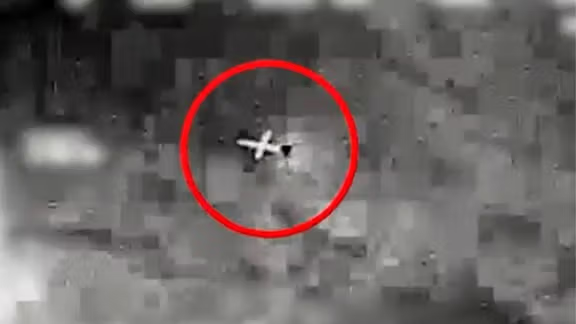
Israeli Defense Minister Benny Gantz has confirmed that the drones Hezbollah launched toward the Karish gas rig last week were Iranian unmanned aerial vehicles (UAVs).

Israeli Defense Minister Benny Gantz has confirmed that the drones Hezbollah launched toward the Karish gas rig last week were Iranian unmanned aerial vehicles (UAVs).
In a briefing to military reporters on Thursday, Gantz said “that Hezbollah carries out missions for Iran, and its weapons are weapons made in Iran whether it is manufactured there or the knowledge acquired by them.”
“The State of Israel knows how to protect its assets well, and Hezbollah must understand that the mission it is carrying out on behalf of Iran could become a deadly mission that will first and foremost harm the interests of Lebanese citizens,” he added
On Saturday Israel intercepted three Hezbollah drones launched toward one its Mediterranean gas rig Karish. After Saturday’s incident, parts of the drones were retrieved and taken for examination.
Hezbollah confirmed it launched the drones after its chief Hassan Nasrallah threatened Israel after a new drilling platform arrived at the gas field a month ago.
The gas field near Lebanon's coast -- which sits in a maritime area claimed by both Lebanon and Israel -- will produce gas not only for Israel, but eventually also for the European Union, tapping into EU countries' quest to replace Russia as an energy supplier since it invaded Ukraine.
He also vowed to increase funding and accelerate development of a laser air defense system, set to be showcased for US President Joe Biden during his trip next week. Israel reportedly intends to ask Biden to approve the delivery of the system to Arab countries aligned against Iran, including Saudi Arabia.
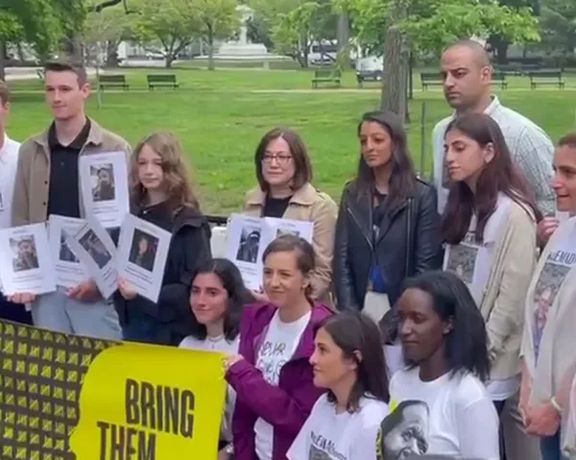
Families of US citizens held by adversaries including Russia, China, Venezuela and Iran, have teamed up to pressure President Joe Biden to intervene to try to release their loved ones.
Impatient with the quiet lobbying of the administration that produced limited results, the families have started to collectively urge Biden to make the issue a higher priority and take more concrete steps such as arranging further prisoner swaps with foreign governments, Reuters reported on Thursday.
In a guest essay for the New York Times written "while caged in Iran’s notorious Evin Prison,” Iranian-American businessman Siamak Namazi, who is the longest-held Iranian American prisoner, asked Biden to “End This Nightmare.”
Russia's April release of former US Marine Trevor Reed – who was exchanged with a Russia pilot after three years of detention -- intensified calls by relatives of others held overseas for Biden to act.
Neda Shargi, the sister of jailed Iranian-American businessman Emad Sharghi (Shargi), said, "The momentum and collective voice that you see among the families was... really sparked by the Reed release." "We are stronger together than in our individual advocacy."
Some families have launched the Bring Our Families Home Campaign and even demonstrated outside the White House to make their efforts more visible.
The US government has not disclosed an official number of Americans detained abroad. The James W. Foley Legacy Foundation lists more than 60 US citizens wrongfully in countries including Belarus, Burkina Faso, Cambodia, China, Cuba, Egypt, Mali, Myanmar, Nicaragua, Russia, Saudi Arabia, Syria, Turkey, Uganda, the United Arab Emirates, Venezuela, Yemen, and Iran.

The United States says it is working to advance a partnership for air defense among Middle East allies to counter the growing missile threat from Iran.
Days before President Joe Biden’s trip to the region and his meeting with Saudi Arabia’s King Salman and visit to Israel, National Security Council Coordinator for Strategic Communications, John Kirby speaking of the Middle East on Thursday said, “What happens over there definitely affects us here at home.”
The plan to set up coordination between air defenses of Saudi Arabia, Israel, the United Arab Emirates and other allies goes back months, as The Wall Street Journal reported in June that a secret meeting took place between top military officers of the countries involved in Sharm El Sheikh, Egypt in March.
Representatives came from Israel, Saudi Arabia, Egypt, Qatar and Jordan.
In June, Israeli leaders were more forth coming is mentioning air defense cooperation with Arab countries under US aegis, but Kirby on Thursday spoke more clearly than before.
“There’s a greater collaboration across the region on issues like air defense, and we’re continuing to work on integrated air defense capabilities and frameworks across the region… because the whole region is concerned about Iran and their burgeoning and growing ballistic missile capabilities… and continued support for terrorism across the region,” he said.
Iranian officials appear to be concerned with the growing close ties between Israel and rich Arab oil producers, something that would be taboo in the Arab world prior to 2020 when with Abraham Accords several Arab countries normalized ties with Israel. Saudi Arabia, although with reported secret cooperation with Israel, has so far preferred not to openly establish diplomatic ties.
Iran’s Supreme Leader Ali Khamenei, hardliner President Ebrahim Raisi and others have warned Persian Gulf Arab countries not to rely on Israel or allow it to establish a military-intelligence foothold in the region.
In April, Raisi compared friendship with Israel to keeping “a snake” in proximity. Those Muslim countries that "normalize relations with the blood-shedding Zionist regime resemble those who would keep a snake in their sleeves," he said.
But with no agreement on its nuclear program after 15 months of diplomacy with the West and its growing atomic potential and missile program, Tehran has little concrete arguments against a brewing region-wide alliance against its ambitions.
Kirby also told reporters, “There is a growing convergence among nations in the region of concern about [Iran’s] advancing ballistic missile program and their support to terror networks.”
Among the Persian Gulf countries involved in military discussions, only Qatar maintains friendly ties with Iran, trying to be a broker in jump starting nuclear talks stalled since March, but Tehran apparently is hoping its potential to supply oil to world markets after Russian sanctions can fetch more concessions from the United States.
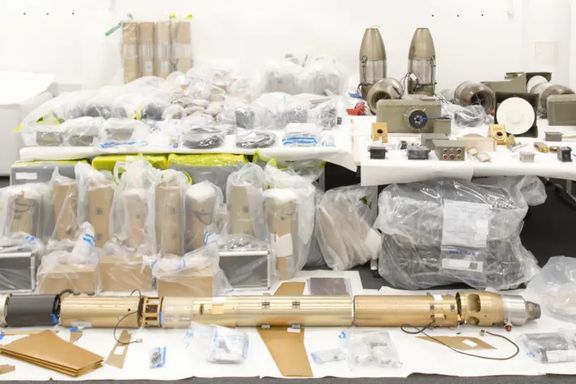
The UK defense ministry revealed on Thursday that the British Royal Navy seized cruise missiles from an Iranian vessel earlier this year in waters south of Iran.
Royal Navy ship HMS Montrose seized dozens of packages containing advanced weaponry from speedboats being operated by smugglers in early 2022, during routine maritime security operations in the Gulf of Oman, the British government statement said.
The seized packages were sent to the UK for technical analysis which later revealed that the shipment contained multiple rocket engines for the Iranian produced 351 land attack cruise missile and a batch of 358 surface-to-air missiles.
The 351, a cruise missile with a range of 1,000km, is regularly used by the Houthis to strike targets in Saudi Arabia and was also used in the January attack on Abu Dhabi, which killed three civilians.
The United Kingdom’s Embassy in the United Arab Emirates described the seizure as “the first time a British naval warship has interdicted a vessel carrying such sophisticated weapons from Iran”, yet another proof of Tehran’s support for Yemen’s Houthi rebels in the war-torn country.
Earlier in the month, the United Nations once again confirmed that missiles launched by Yeme’s Houthi militia at Saudi Arabia and the United Arab Emirates in the past two years were Iranian.
Noting that the UK will continue to work in support of an enduring peace in Yemen, Minister for the Armed Forces James Heappey said, “The UK is committed to upholding international law, from standing up to aggression in Europe to interdicting illegal shipments of weaponry that perpetuates instability in the Middle East.”
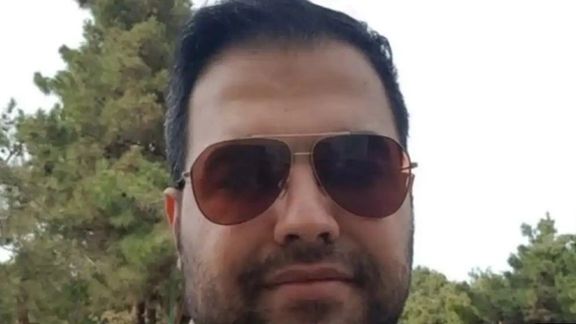
A court in Istanbul has sentenced several of the 14 accused of assassinating Iranian dissident Masoud Molavi-Vardanjani on behalf of Iranian intelligence.
In March 2020 Reuters reported that two senior Turkish officials had confirmed that two Iranian intelligence officers at Iran’s consulate in Istanbul had instigated the killing of Molavi-Vardanjani.
The court sentenced Turkish hitman, Abdulvahap Koçak, to life imprisonment for shooting Molavi-Vardanjani in Istanbul’s Şişli neighborhood in November 2019 while he was walking with Ali Esfanjani, an Iranian national who masterminded the assassination.
The court also sentenced Turkish nationals Cengiz Akin to a prison term of fifteen years, Veli Sarı to twelve years and Birol Özdemir to six months for assisting in the crime.
Iranian national Siavash Abazari Shalamzari was sentenced to two years and six months in prison on charges of forging official documents. The accused have the right to appeal their sentences.
Molavi-Vardanjani, a former Iranian intelligence operative and a civil engineer by education, fled to Turkey in 2018 and launched a Telegram channel, called Black Box, focused on corruption allegations against Iran’s extraterritorial Qods Force, top officials in the office of Supreme Leader Ali Khamenei, judges and other senior figures. “I will root out the corrupt clan commanders,” he wrote in one post, never updated after his death. “Pray that they don’t kill me before I accomplish this.”
The lawyer representing Molavi-Vardanjani’s family in Istanbul said in May that Iran’s security forces had confiscated his parents’ passports at Tehran’s International Imam Khomeini Airport to prevent them from traveling to Turkey to attend the court sessions.
The court has decided to investigate the cases of three Iranian nationals – Ali Esfanjani, Mohammadreza Naserzadeh, and Naji (Naci) Sharifi-Zindashti – separately and acquitted the remaining defendants, which has led to speculation that Ankara might have made a deal with Tehran to let some of the defendants off the hook.
Mohammadreza Naserzadeh, staff member of the Iran’s Istanbul consulate, was arrested in connection with Molavi-Vardanjani’s assassination in February 2021. He was accused of forging travel documents for the mastermind, Esfanjani, and helping him flee to Iran three days after the assassination.
The three Iranian nationals, including Sharifi-Zindashti, a well-known international drug trafficker and head of a cartel of the same name, have all fled or returned to Iran.
Sharifi-Zindashti has also been accused of assisting Iran’s intelligence ministry in the abduction of Habib Asyud (also known as Habib Chaab), an Iranian-Arab leading separatist, and delivering him to Tehran in November 2020, as well as the alleged killing of the Iranian fugitive judge Gholamreza Mansouri in the Romanian capital Bucharest in June 2020.
In December 2020, Turkish media reported that Turkish Intelligence had dismantled a network tied to Iran’s Intelligence Ministry that had abducted or assassinated dissidents, including Chaab.
Turkey has arrested dozens of Iranian and Turkish nationals in the past few years over alleged plots to kidnap or assassinate Iranian dissidents.
Last month Turkey said it thwarted a planned attack against Israeli tourists in Istanbul, and detained eight suspects allegedly working for an Iranian intelligence cell.
Turkey had reportedly warned that it was not prepared to allow Iran to use its territory to carry out acts of terrorism against other nations amid urgent Israeli warning to its citizens not to travel to Turkey for fear of abduction by Iran. Tehran said Israel had waged a psychological operation and a smear campaign against Iran to sabotage relations between Tehran and Ankara.
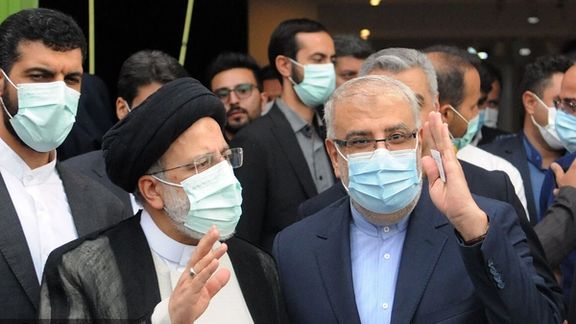
The Iranian government faced a serious problem in collecting revenues in the first 2 months of the calendar year, with oil income far from the expected amount.
The Supreme Accounting Office has released a report covering the period March 21- May 20 that shows except tax revenues, all other major sources of income grossly underperformed, which local media said was a serious warning for the government and the economy.
The government’s revenues from taxes, oil exports, customs duties, etc. totaled 880 trillion rials or about $3.5 billion (average free market exchange rate) in the 60-day period. This was just 37 percent of the projected budget revenues. However, it was forced to spend almost $5 billion in the same period. This was also about half of what the government had to spend, appropriating money to various ministries and provinces.
But the most notable number in the report is how little oil income was collected. While 79 percent of tax revenues were realized, only 15 percent of oil export income entered government coffers.
This is despite constant claims by Iranian officials that oil exports have increases by 40 percent in the past 12 months, which to a large extent correspond with what tanker traffic monitoring companies around the world have confirmed.
Iran’s budget was set with the expectation of 1.2 million barrels of oil exports per day. The consensus among observers is that Iran has shipped anywhere between 750,000 to close to a million barrels a day, while prices have spiked since the budget was approved. Therefore, oil export income should be close to what was set in the budget.
There could be a few explanations for the huge financial discrepancy mentioned in the Supreme Accounting Office report.
One possibility is that Iran is not receiving cash for the oil exports that largely end up in China. Many have mentioned barter trade, whereby Iran receives goods in lieu of the oil sent to China. The other possibility is that Beijing is keeping the money for now, given United States’ banking sanctions on Iran.
However, oil minister Javad Owji claimed on July 4 that Iran is receiving 80 of oil proceeds in cash and only 20 percent in barter. If this is true, then one can wonder where the money is and how it happened that the government got only 15 percent of what it expected.
This brings us to the second possibility. Cash collected from oil exports does not end up in government coffers and instead it is distributed to ‘revolutionary’ entities in Iran and abroad whose existence and operations are deemed essential for the regime, which is controlled not by parliament or presidential administrations, but by Supreme Leader Ali Khamenei.
It has always been known that the official government budget pertains to routine operations, such as civilian ministries and the large public-sector industrial companies, banks, etc.
The Revolutionary Guard, for example, has a nominal public budget appropriated by parliament, which is around $4-5 billion, but according to some estimates it spends at least $17 billion. The same is about secret expenditures to support military, intelligence and influence operations in Iraq, Syria, Lebanon and elsewhere.